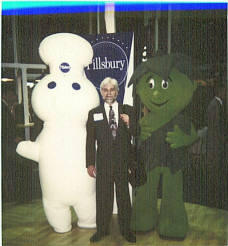It was primitive, almost guttural, but we may be able to look back and cite Mork, of the 'Mork and Mindy' show, as being visionary, or, at least, planting the seed.
A staple of the program was Mork's greeting - "Na-Nu Na-Nu" (pronounced "nah-noo nah-noo")
Was he trying to tell us something, something too abstruse for us to understand?
Was he attempting to share elements of his planet (Ork)?
Maybe so.
Everyday nanotechnology ... Nanobots don’t yet scrub clogged arteries, but nano-particles are improving many ordinary productsLong the stuff of hype and occasional hysteria, nanotechnology is quietly merging into modern life, its minuscule particles infused in an array of products, ranging from stink-proof socks to life-saving cancer medications.
Just remember, when all these products are commonplace, it was back in the 1070's we had our first inkling of what was to come;
[snip]
Holman reckons that by the middle of the next decade “nanotech will touch $3.1 trillion worth of products’’ worldwide. By and large, “nano-particles’’ will be used to make existing products tougher, more flexible, or more energy-efficient - faster computer processors, more moldable plastics, sprayable films able to act as solar collectors - rather than to create entirely new entities, at least at the outset.
But analysts and scientists say extraordinary new devices and techniques are not far off, especially in the realms of medical treatment, power sources, and consumer electronics. Picture cellphones so thin and flexible they can be worn as neck scarves. Imagine assembly lines “staffed’’ by viruses. Think of concrete produced with just a fraction of today’s pollutants (concrete production is a major emitter of greenhouse gases), but able to endure for thousands of years.
[snip]
For now, though, most nano-products are almost numbingly prosaic: stickier dental adhesive, mildew-resistant paint, and stain-proof khakis. Plus a handful of pharmaceuticals whose nano-properties make them somewhat more effective than standard treatments, but hardly wonder drugs.
[snip]
That’s a far cry from a few years ago, when nanotechology aroused feverish visions and fantastic fears. Futurists predicted microscopic “nanobots’’ coursing through human systems to root out cancer cells, scrub clogged arteries, and repair tissue. Alarmists raised fear of “gray goo’’ - self-replicating swarms of nano-particles - devouring the planet.
“Instead of nanobots, we got sunscreens,’’ Maynard wryly noted, referring to new lotions containing nanoparticles able to deflect the most damaging wavelengths of sunlight. “Nano’s development is proving more evolutionary than revolutionary. The cool stuff is still in the labs. But some incredible medicines and [micro-engineered] electronics are getting closer to reality.’’
"Na-Nu Na-Nu"
Monday, August 17, 2009
Mork Ahead of His Time?
Subscribe to:
Post Comments (Atom)



No comments:
Post a Comment